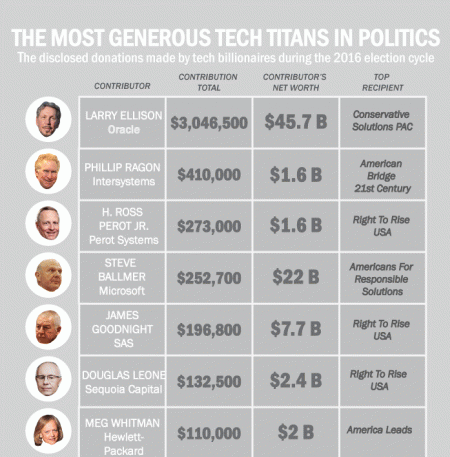How We Let Rich White Men Set The Political Agenda

Way back in 2004, I attended a Ralph Nader event in Philly because I wanted to hear the man out. I didn’t think I would vote for him, and indeed, I did not; I wasn’t terribly impressed by either his shtick or his followers — the ones next to me were young, overripe white guys with “420!!” patches all over their bags. What I remember best, though, was Nader’s Jonathan Edwards-like passion as he thundered from the pulpit, “The only difference between the Democrats and the Republicans is the speed with which their knees hit the floor when big corporations come calling.”
I didn’t agree with the sentiment but it made quite an impression on the crowd, and for good reason. As the Times points out today, Democrats have become favorites of the rich, and it shows.
Democratic Party and its elected officials have come to resemble their Republican counterparts far more than the public focus on polarization would lead you to expect. The current popularity of Bernie Sanders and his presidential candidacy notwithstanding, the mainstream of the Democratic Party supports centrist positions ranging from expanded free trade to stricter control of the government budget to time limits on welfare for the poor. …
The structural forces changing the character of the Democratic Party appear in voting patterns and in the altered partisan allegiance of the professional classes and of the very rich.
Some of this untrammeled trading of money for influence can be traced to Citizens United, and some goes further back to the failure of any meaningful campaign finance reform to change the way candidates have to fund their bids for re-election. If you need massive amounts of money to run for office, the most efficient way to get it is to cozy up to the people who have massive amounts of money to give away; and you cozy up to them by making sure they know that you share their values. Eventually you do end up sharing their values, at least some of them, even if you didn’t initially. How could you not?
And the amounts necessary to compete only get more cartoonish as years go by. Nowadays, the fact that the Koch brothers are reportedly considering giving a BILLION DOLLARS to Marco Rubio doesn’t even qualify as that much of a shock. Even though that is, as Sean McElwee points out on Twitter, a full one-seventh of all campaign spending in 2012.
Not to be outdone, Silicon Valley has been ramping up its donations too.
The total amount of contributions funneled into politics from the California tech mecca over the past two presidential election cycles topped more than $109 million, compared to a total of about $83.3 million from 1992 to 2004.
As a chart that Forbes put together shows, most of these tech titans are giving to conservatives.

“Right To Rise USA” is Jeb!’s super PAC, which means, in case you like inside baseball, that H. Ross Perot, Jr., has given six figures in this cycle alone to a Bush. His father, Ross Perot, disagreed so vehemently and publicly with the policies of Jeb!’s father, President H. W. Bush, that he ran for president as an Independent. Interesting how times change.
Also of note: “America Leads” supports Chris Christie, which means Meg Whitman, the current HP CEO, is betting against Carly Fiorina, the former HP CEO. Oh, to know the full story there.
On the liberal side, “American Bridge” is a progressive PAC not officially affiliated with any candidate, while “Americans for Responsible Solutions,” founded by Gabrielle and Mark Giffords, is waging a quixotic battle for gun control. Further down the list, there are more five-figure donations to Democratic candidates, but it certainly seems as though more super-rich types continue to favor Republicans.
Still, according to McElwee on Salon, the shade of money we should be most worried about is not blue or red. It’s white.
Already the wealthy are pouring money into the election: Politico reports that the 67 biggest donors, who have each given a million dollars or more have donated three times more than 508,000 small donors combined. A new report from Every Voice Center finds that individuals living in 1 percent of the nation’s zip codes (equal to 4 percent of the population) are responsible for half of the $74 million the 10 candidates who have raised the most so far. Every Voice reports that just three rich, and heavily white neighborhoods gave more to politicians than 1,248 majority African-American districts. …
the wealthiest Americans are far more likely to oppose government action to remedy inequality than the least wealthy (see chart). Their sample is nearly all (96 percent) white, and comprises 68 percent donors, suggesting that the views Piston finds at the lower levels of the donor rung are true at the highest levels as well, if not even more pronounced.
As McElwee and the Times article spell out, there are serious policy ramifications when rich, white people are allowed to set the political agenda. Right now, though, that is our status quo — and it’s true, to some degree, of whichever party you support.
Support The Billfold
The Billfold continues to exist thanks to support from our readers. Help us continue to do our work by making a monthly pledge on Patreon or a one-time-only contribution through PayPal.
Comments